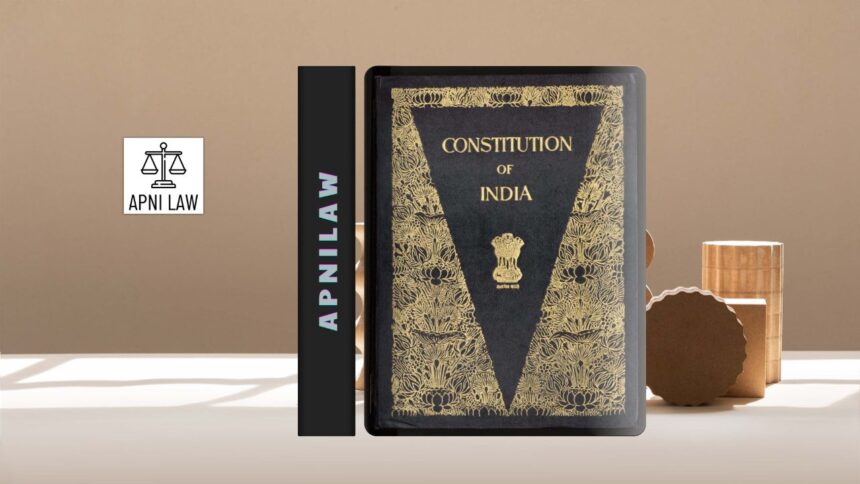Introduction
The Indian Constitution is not just a legal document; it is a promise to its citizens that their dignity and freedom will be respected. Among its Fundamental Rights, the Right Against Exploitation, covered under Articles 23 and 24, ensures that no person is forced to live under conditions that strip away human dignity. These provisions safeguard individuals from forced labor, human trafficking, and exploitative child labor practices.
Exploitation in its many forms, whether through bonded labor, trafficking of women and children, or forcing minors into hazardous work, has been one of the darkest realities of human society. India, with its diverse population and history of socio-economic inequalities, recognized the urgency of tackling this issue head-on. By including Articles 23 and 24 in the Constitution, the framers gave a strong message that freedom means nothing without protection from exploitation.
Article 23: Prohibition of Human Trafficking and Forced Labor
Article 23 directly addresses human trafficking, begar (forced labor without payment), and other forms of compulsory service. It makes them unconstitutional, reinforcing the idea that every person has the right to control their own labor and body.
This provision also applies against practices like bonded labor, where people, often from low-income backgrounds or marginalized communities, were forced to work to repay debts that never seemed to end. The law criminalizes such practices, making them punishable by imprisonment and fines.
Courts have often stepped in to expand the meaning of Article 23. In People’s Union for Democratic Rights v. Union of India (1982), the Supreme Court ruled that paying workers less than the legal minimum wage amounts to forced labor. This judgment widened the scope of protection, making Article 23 a living safeguard against modern forms of exploitation.
Another landmark case is Bandhua Mukti Morcha v. Union of India (1984), where the Court recognized bonded labor as a violation of human dignity. The ruling emphasized that the government had a duty to identify, release, and rehabilitate bonded laborers. Through such interpretations, Article 23 has become a powerful weapon in fighting systemic exploitation.
Article 24: Prohibition of Child Labor
Article 24 takes the protection further by prohibiting the employment of children below the age of 14 in factories, mines, or other hazardous jobs. This provision ensures that children are not robbed of their right to education and a healthy childhood.
Historically, children from families with low income were pushed into labor due to poverty. Many were found working in match factories, carpet weaving, or mining industries, where conditions were dangerous and harmful. Article 24 sought to end this cycle by making child labor in hazardous sectors illegal.
The Supreme Court in M.C. Mehta v. State of Tamil Nadu (1991) dealt with child labor in match industries and directed the state to take steps for their rehabilitation and ensure compulsory education. The Court linked child labor prohibition with the broader right to education, which later found explicit recognition in Article 21A of the Constitution.
Article 24 does not ban children from working in all sectors, for example, helping family businesses or working in fields may not fall under hazardous labor. However, laws like the Child Labour (Prohibition and Regulation) Act, 1986, and its amendments have progressively expanded the scope of protection to ensure children’s welfare.
Historical Background and Need for Protection
Exploitation was a grim reality in pre-independence India. Practices like bonded labor, begar, and child exploitation were deeply entrenched in society. Families with limited resources often fell into exploitative arrangements, unable to break free from generational cycles of poverty.
The Constituent Assembly debates reflect how leaders strongly believed that political freedom had no meaning without social and economic freedom. Dr. B.R. Ambedkar highlighted the importance of equality and dignity, which inspired the drafting of Articles 23 and 24.
By placing these protections within Fundamental Rights, the Constitution made sure that they are enforceable in courts. This step was crucial because it transformed ideals of social justice into enforceable legal rights.
Importance in Contemporary India
Even today, the relevance of Articles 23 and 24 cannot be overstated. Despite strict laws, trafficking, bonded labor, and child labor still exist in many parts of the country. Rapid industrialization, migration, and poverty continue to expose vulnerable communities to exploitation.
The judiciary, along with non-governmental organizations and activists, has played an active role in ensuring that these rights are not just words on paper. Campaigns against child labor, rehabilitation of bonded workers, and rescue operations against trafficking have been crucial steps in giving meaning to these constitutional guarantees.
Moreover, the link between Article 23, Article 24, and Article 21 (Right to Life and Personal Liberty) shows how the Constitution weaves together different rights to create a framework for human dignity. Without protection from exploitation, the promise of equality and liberty would remain hollow.
Frequently Asked Questions
1. What practices are banned under Article 23 of the Indian Constitution?
Article 23 bans human trafficking, bonded labor, begar, and any other form of forced labor. It ensures that no individual can be exploited against their will, even if they belong to marginalized or low-income communities.
2. Does Article 24 prohibit all child labor in India?
No, Article 24 prohibits children below 14 years of age from working in factories, mines, or hazardous industries. However, children may still help in non-hazardous family work, though the state has progressively expanded laws to minimize all forms of child labor.
3. Why are Articles 23 and 24 important in modern India?
These articles are vital because exploitation has not disappeared. Trafficking, bonded labor, and child labor still persist in many parts of the country. Articles 23 and 24 provide the constitutional framework to fight these issues and ensure dignity, equality, and justice for all.
Conclusion
The Right Against Exploitation under Articles 23 and 24 is one of the most humane provisions of the Indian Constitution. It recognizes that true freedom lies not just in political independence but in living without fear of being exploited. Article 23 protects people from forced labor and trafficking, while Article 24 ensures that children are not pushed into hazardous industries.
These rights have been reinforced by landmark court judgments and supported by legislation to make them meaningful in practice. While challenges remain, the principles behind these Articles continue to guide India’s journey toward justice and equality. By protecting the most vulnerable, people with low income, marginalized groups, and children, the Constitution lives up to its promise of dignity for every individual.
For any specific query call at +91 – 8569843472







